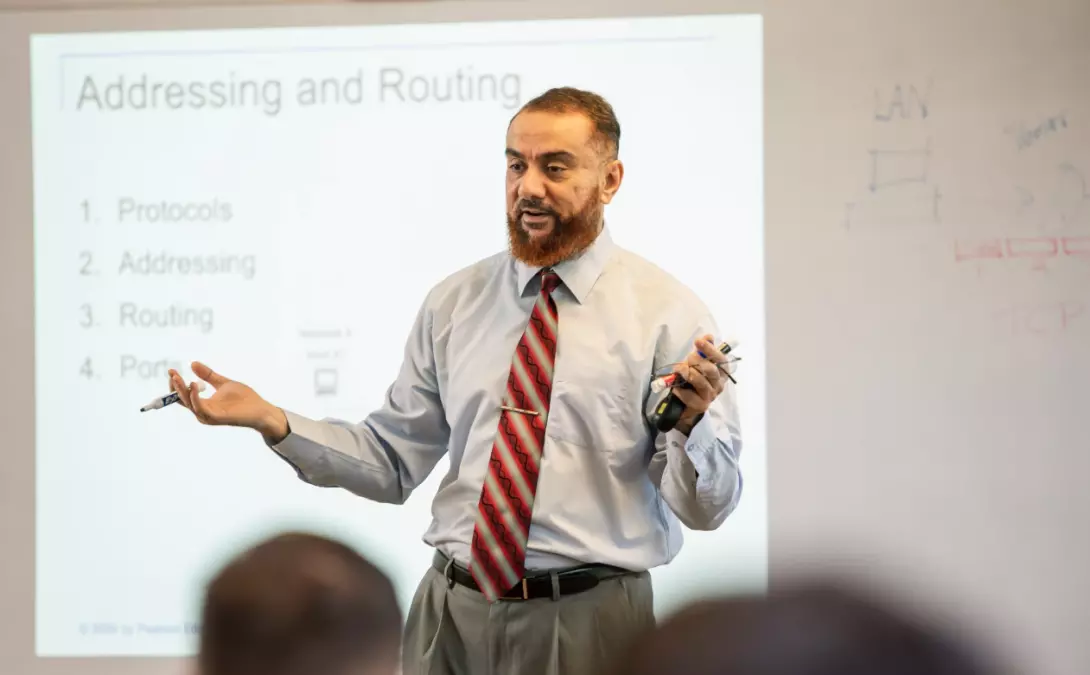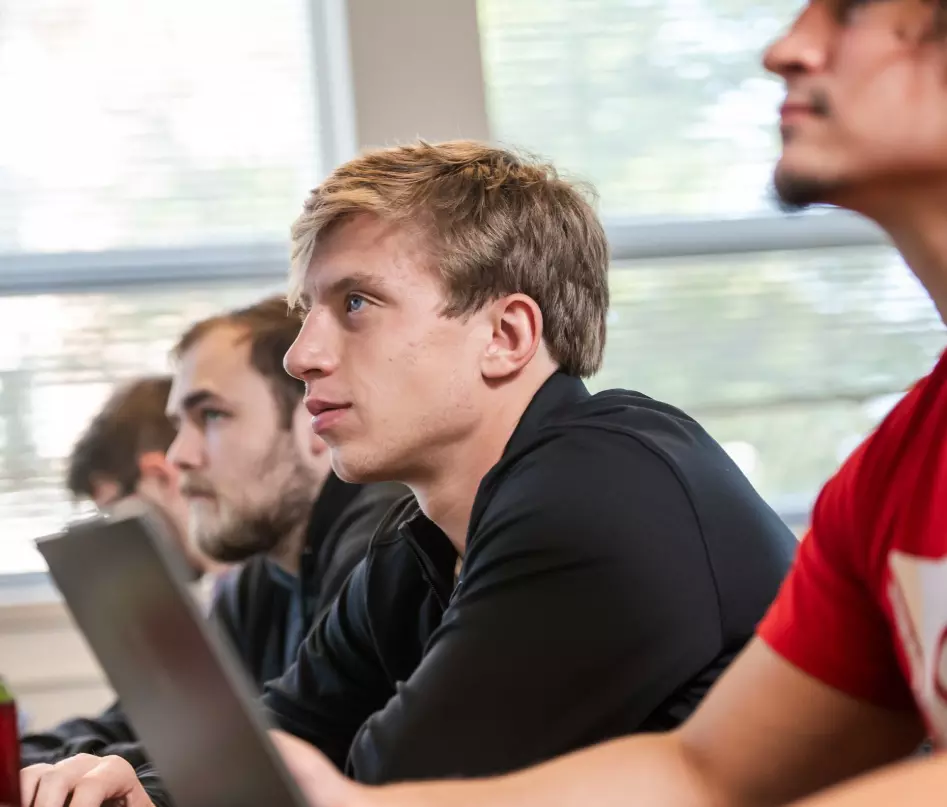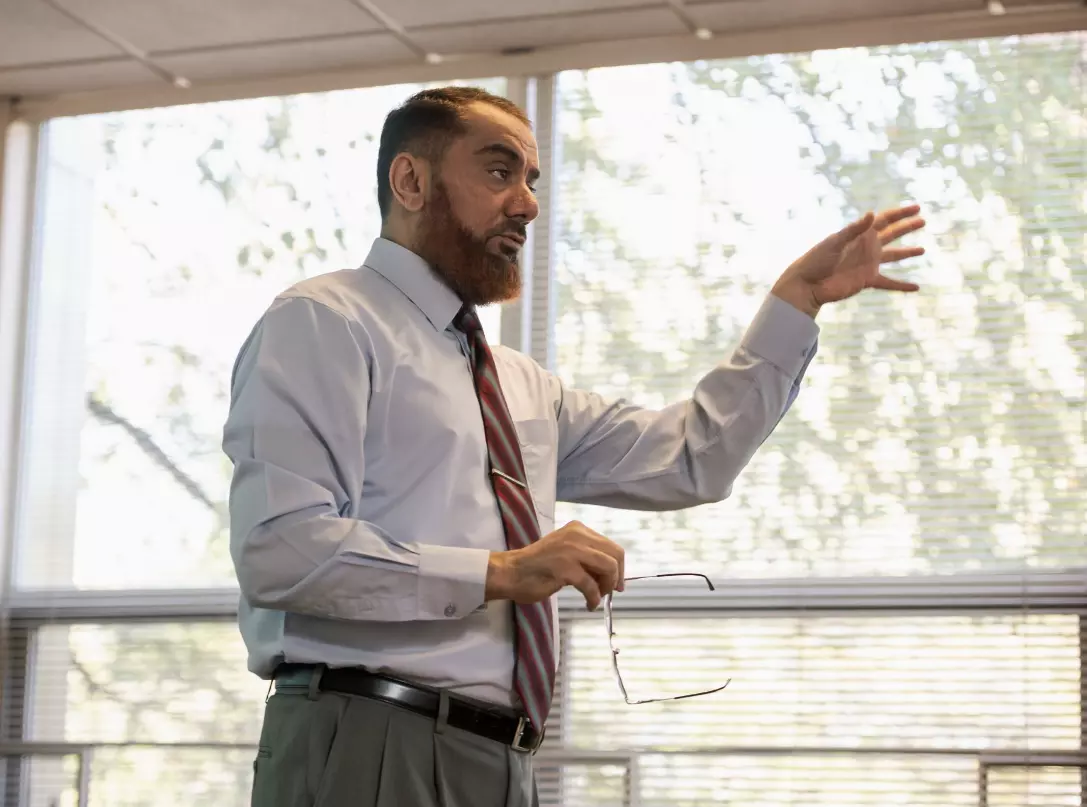
Face-to-face cybersecurity courses available with new full-time professor
Abdulbast Abushgra allows Ashland University to do something it hasn’t been able to do the past few years – offer face-to-face cybersecurity courses.
“Ashland University has not had a full-time assistant professor of cybersecurity since spring 2022,” said Christopher Swanson, Ph.D., 25-year AU professor of Mathematics. “As there is a desire to grow the cybersecurity program, it was vital that we hire Dr. Abdulbast Abushgra to teach face-to-face courses, interact with students outside of the classroom during cybersecurity club meetings and lead the Department of Mathematics and Computer Science on its cybersecurity curriculum and the promotion of the cybersecurity major.
“Dr. Abushgra joins Ashland University having teaching experience with cybersecurity courses and with a vision as to where to take our program,” added Swanson, who was the chair of the hiring committee that brought Abushgra to AU.

Abushgra has significant experience in teaching cybersecurity
Abushgra taught cybersecurity for five years at Utica University in upstate New York before coming to Ashland University.
“It had its own department and is one of the top 10 cybersecurity colleges in the nation,” Abushgra said about Utica.
“I liked Utica except for the weather,” added Abushgra, who grew up in Libya and earned his bachelor’s degree (architecture engineering) and two master’s degrees (engineering management and urban planning) in that African country. “The weather was not my friend. A lot of snow.
“I was looking for a different region to move to for about two years,” added Abushgra, who received his Ph.D. in computer science and engineering from the University of Bridgeport in Connecticut, where he lived from 2012 to 2017 while working toward his Ph.D. and where most of his six children, who range in age from 2 to 14 years old, were born.
He considered returning to Libya after earning his Ph.D., but his mother convinced him to stay in the U.S. because of the unrest in his native country.
Since he and his wife left Libya at the end of 2010 for the U.S., Abushgra hasn’t returned to see his or his wife’s family. They came to America shortly before revolution broke out in Libya, first spending a year at an English learning center in Denver before starting his American academic studies.


Looking to grow Ashland University’s cybersecurity program
Planning to continue his career in the U.S. and liking Ashland, Abushgra said he is looking forward to helping AU’s cybersecurity program grow.
“I would like to see this program move forward and not just be a program to fill a small gap somewhere,” Abushgra said. “I would like to help build this program to something big, like a flagship program in Ohio. I believe we have the ability and the faculty and the leadership to do it.”
Growing its cybersecurity offerings was one of the best ways to grow the Computer Science program and having in-person classes will help grow cybersecurity, said Gordon Swain, Ph.D., interim chair of the Department of Mathematics and Computer Science while the current chair, Swanson, is on Senior Study Leave this semester. Recently, cybersecurity classes have been taught online by adjunct professors.
“Cybersecurity is a field that is growing really fast, and it just continues to change,” said Swain, who has been teaching mathematics at AU for 31 years. “Absent somebody to bring the program along and to continue to update it, it could get stale pretty fast.
“We really hope that not only will the students gravitate to the program, but their classes will feel more real and more like a community and we can keep changing the curriculum as much as we need to, to keep it fresh and up to date,” Swain added.

Computer Science now has two full-time instructors, cybersecurity lab
The only other full-time AU computer science instructor, Associate Professor Selvanayaki Kolandapalayam Shanmugam, Ph.D., said she is happy to have someone who will take care of cybersecurity, which isn’t her area of expertise.
“There also is a cybersecurity club that needed someone to be in charge of for competitions and conferences,” said Shanmugam, who reinitiated the AU chapter of the Association of Computing Machinery (ACM) club, which had been inactive for a while when she came to Ashland in 2021.
And there is now a computer lab dedicated to cybersecurity.
“It’s kind of in its infancy,” Swain said about the cybersecurity lab. “That will be super advantageous for the students because they have wanted to do hands-on work. They used to be able to do simulated work, but now they will actually have machines in front of them to do real-life work.”
The students wanting to be pushed has been something Abushgra has liked so far about working at AU. He also likes that Computer Science and Mathematics are in the same department.
“This is a gift for me, working with the Mathematics program,” Abushgra said. “My former institution was under the business school. I’m a big fan of cryptography, a mix of computer science, engineering and math. It’s kind of solving puzzles. Because I love that, I tried many times to advise (Utica University) to encourage students to take more math. Most of the students there didn’t like math, so that was a big problem. That’s why I’m glad computer science is with math and we work together.”
Shanmugam, who has taught computer science for 23 years and owns a patent for her research on “Autonomous Camera Sensor Network for Anomaly Detection,” also likes the pairing of computer science and math at AU.
“Students who have good mathematical skills will be good computer scientists,” said Shanmugam, who also likes to incorporate research projects into her classes because she believes that helps her students become more employable.
The expansion of cybersecurity offerings also should help AU students find good jobs after graduation.
“Employers like a more specialized area of expertise,” Abushgra said. “Now I am teaching general cybersecurity classes. I would like to eventually teach more specialized classes in cybersecurity operations, management, forensics, crime investigation.”
Abushgra’s colleagues also are excited about the possibilities of course offerings with the addition of Abushgra and face-to-face cybersecurity classes.
“The faculty in the Department of Mathematics and Computer Science are excited about the potential offered by face-to-face cybersecurity education,” Swain said, “and being able to serve students even better.”
